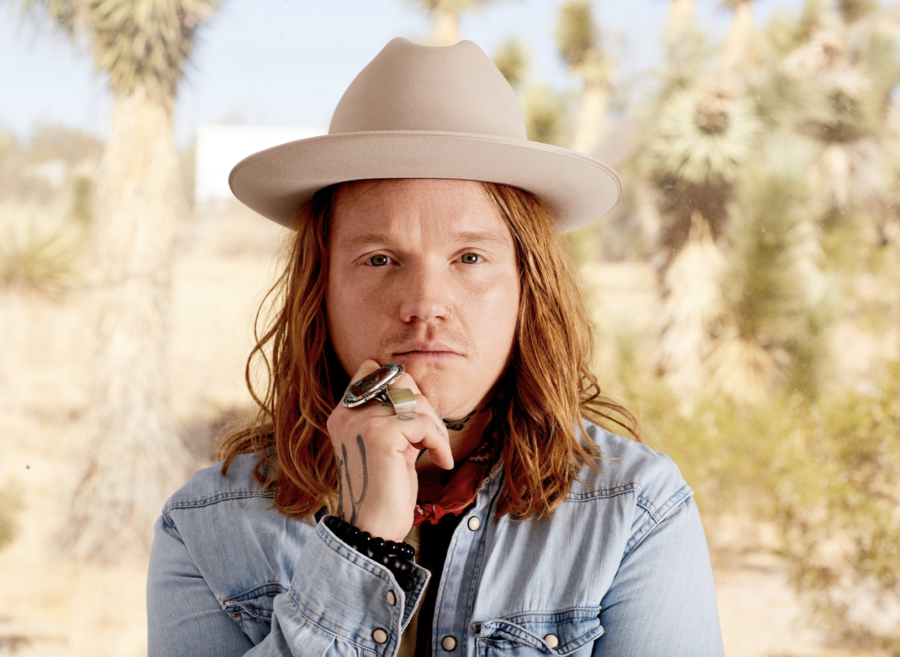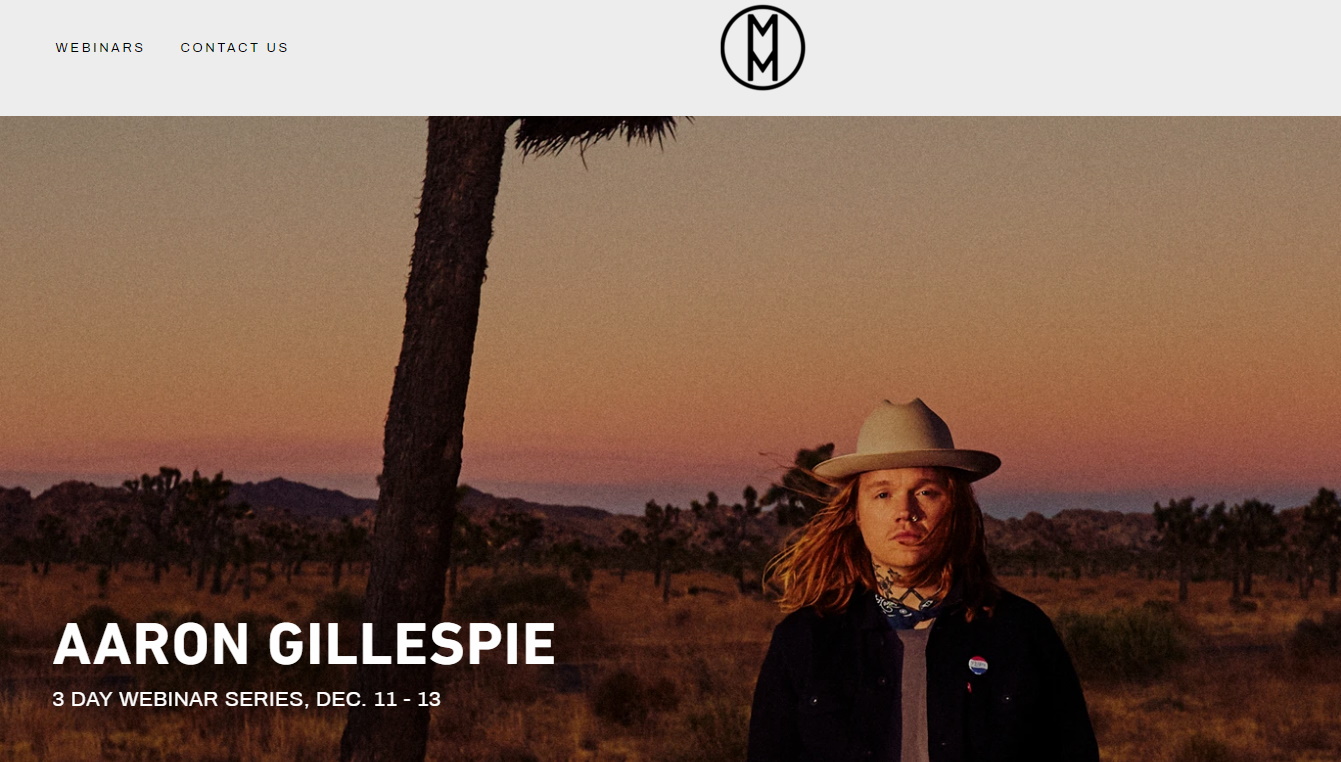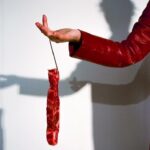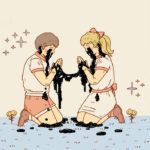Interview: Aaron Gillespie (Underoath/The Almost) on 2020, His Songwriting Workshop, and Underoath Observatory
Posted: by admin

With touring grinding to a halt during the ongoing Covid-19 pandemic, musicians have had to develop a kind of “quarantine ingenuity” to connect with and perform for their fans. There have been few better examples than this summer’s Underoath Observatory, when the band gathered in Florida for a month and converted a nondescript warehouse into an in-the-round experience that saw nine camera operators shooting the six-piece in 24 frames per second as they performed three albums in their entirety over three consecutive weeks.
And this month, Aaron Gillespie—Underoath drummer and vocalist, The Almost frontman, solo artist, and professional songwriter—is continuing that ingenuitive spirit with a three-day drumming and songwriting clinic through Music Mentors, where participants can learn how to make drumming into a career, play through Gillespie’s favorite songs (Underoath and otherwise), tap the professional songwriter’s brain for his best tips and more.
Both events gave or will give desperate fans a chance to interact with their favorite musicians while staying at home; the drumming and songwriting clinic honors the self-education spirit that’s cropped up during quarantine of people teaching themselves skills through MasterClass and other platforms.

The natural question: What was the background and inspiration for these kinds of events in 2020? At least, it seems like a natural question. “I have to say, I talk to people on the phone all day and no one’s asked me this question yet,” Gillespie says, laughing. Then, what every journalist loves to hear: “I’m going to be blunt.”
“I’m 37,” Gillespie says. “I’ve been full-time touring since I was 17 years old. I celebrated my first birthday since I was 17 not on tour this year. I have been on the road for 20 years in one iteration or another.” Gillespie doesn’t mean to be irreverent. But this year has put a lot of truths in focus for him. “This year has been a dumpster fire in so many ways. But I’ve loved being with my family. My wife had a baby during quarantine. My daughter is six months old now; this person is eating solid foods, and she was born during Covid! It’s wild,” he says. (Gillespie also has a son, who is nine.)
While honoring and acknowledging how difficult the industry’s pause has been for so many, quite a few musicians have confessed a sense of relief from the respite of touring. But many have also sought unique ways to connect authentically with their fans, and with music, during this strange time. Underoath and Gillespie have been trailblazers in that regard. “I miss people; more than anything, what we are and what we do as musicians is we’re people people,” Gillespie says. “That’s my life, meeting people and connecting with people.”
In April, Underoath began discussing the possibility of doing a livestream series. They had seen some of the other livestreams musicians had done, but they didn’t like the format—bands playing onstage in front of a camera. “It felt phoned-in,” Gillespie explains, clarifying that it wasn’t the fault of the musicians, but the whole vibe of the thing that didn’t sit right. With the belief that livestreams should bridge the gap between fans and artists, Underoath designed something they felt would “scratch the itch.”
To film the Observatory performances in the warehouse, it took 33 people, with 15 operating inside the now-signature lighted circle itself: the six band members and the nine camera operators. It required a fair bit of sacrifice in the pursuit of success; Gillespie had to leave his wife at home in Utah with their 22-day-old newborn to be in Florida for the month. He had thought about Covid testing and flying home in between the three Friday performances, but she insisted he stay.
“It was fucking crazy; that’s one of those things you don’t know how you pulled it off,” he says. “It was special. I’m happy I got to be part of it.” While the final Observatory performance teased future performances of Disambiguation and Erase Me, the band doesn’t have set plans for them yet. (Take heart, Underoath fans; it’s in service of working on their new album.)
The band wanted fans to feel like they were there. They got their wish. The performance was immersive and cinematographic, unlike anything that had been done to that point and, really, anything that’s been done this year in music. Gillespie praised Billie Eilish’s “insane” “Where Do We Go” livestream, but noted that she had, let’s say, significantly more resources to work with. “We had to make this our way,” he says. “It showed us we could make something out of nothing.”
That, Gillespie continues, is the spirit behind his songwriting and drumming workshop, as well. “I just want to connect with people,” he says. “I feel like if nothing exists, you make it. We talk a lot about how bad the world is right now, and there’s a lot of fucked-up shit going on, but the beauty of humanity has been people making things and communicating with each other in strange ways. I love making stuff. I got into this business to make shit.”
Though still a successful musician in his own right, Gillespie has embraced the slight shift in his role from a rock star drummer and vocalist to a mentor and teacher of drumming and songwriting. Few may know of his prolific work in that space; he estimates he spends 90 percent of his time now writing songs for other people over the course of five-to-eight Zoom sessions per week. (He isn’t at liberty to reveal who he’s writing for currently, though he does say some of it’s connected to “people who sing on TV shows.”)
If fans may not realize how many songs Gillespie writes for other people, they’re more than familiar with the ones he’s written for Underoath, The Almost, and his most recent solo album, Out of the Badlands. Those projects encompass a wide swath of songwriting experience; Gillespie famously recorded every instrument on The Almost’s 2007 debut album Southern Weather (with The Startling Line’s Kenny Vasoli helping with bass on a couple songs and providing backing vocals for “I Mostly Copy Other People”), a far different process than in a band setting.
Writing the music, the instrumentals, is the easy part, Gillespie says, and is secondary to a song’s concept, the feeling being portrayed. “I want to say what I want to say and I want people to feel the way I feel when it’s being written,” he says. “I want the lyric or the concept to be ambiguous enough that anybody could put it on and it be theirs.” That’s true whether he’s writing alone or with Underoath.
In the band setting you have more cooks in the kitchen, Gillespie says. But you also have the benefit of bouncing ideas off people. “It can be a little easier than when you’re making music alone, which I do every day, because you can’t look behind you and say, ‘Does this fucking suck?’” he laughs. “With Underoath, it’s not a one-man show, and it never will be. The Almost is kind of a one-man show. That has its pluses and minuses. Wherever a song is gonna take me is where I’m gonna go.” “That’s kind of a ‘crystal hippie’ answer,” he adds, “but that’s kind of who I am.”
Underoath guitarists Tim McTague and James Smith have joked in interviews and play-throughs that they don’t use music theory when they write songs, but rather just “what sounds good,” and Gillespie says that’s “true-ish.” “None of us had time to take music theory classes,” Gillespie says. “We all got in a van when we were teengarers and never came home until the band was popular.”
Through the years, the band and Gillespie especially have learned more about music theory and technical songwriting, such as the Nashville Number System. Naturally, Gillespie’s bands’ sounds have progressed accordingly; on They’re Only Chasing Safety, nearly every song is in the extremely forgiving tuning Drop D. With his shift to singer-songwriter music on Southern Weather, Gillespie mostly used standard tuning.
Underoath’s music now, beginning with Define the Great Line in 2006, is “the most confusing shit in the world,” Gillespie laughs. The band tours with about 20 guitars to accommodate the various tunings. As they work on the new record, which they have been primarily doing over Zoom, they “get themselves into trouble” because they’ll play with so many different tunings and then forget which one they used.
The Observatory and Underoath’s 2019 Erase Me tour, which Gillespie says was the best-attended of any of their tours, even their 2016 reunion tour (Gillespie had left the band in 2010), have proven that the band can continue to reach new heights 20 years later. But Gillespie is satisfied with everything the band, the touring lifestyle, has given him. His primary focus isn’t so much on selling records or playing big shows anymore—“though it would be cool”—but on helping others further their own artist careers. “That’s a really nice place to be,” he says. “I sleep really good at night knowing me and my friends did this shit and it was freaking awesome. But I’m two humans’ father, and I help other people with their shit.”
That’s the focus Gillespie is bringing into his songwriting and drumming clinic, which will run from Dec. 11–13 (seating is limited but still available). Different people will give different songwriting advice, he knows. But his main point of emphasis—his entire philosophy of music, really—is that you don’t need much to make something great. “Heart and feeling and vibe and those things are free,” he says. “Those are things you don’t have to buy a certain plugin or program or drum kit for.”
That ethos is rooted in personal experience Gillespie doesn’t talk about much. Growing up in Florida, his family hovered at the poverty line. “My family ate off food stamps, I never went to the dentist until I was 18, and I never had any money until I had my own money,” he says. He didn’t have his own drum kit until the first Underoath tour, and he wrote all the songs for Southern Weather on a $100 acoustic guitar his mom had bought him, borrowing his producers’ guitars when it came time to record.
But drumming was always in Gillespie’s blood; his mom has photos of him banging away on pots and pans as a kid. Growing up with religious parents is the reason, he says, he was able to play the drums at church; as he got older and booked local shows, his church would let him borrow its drum kit and return it at 5am on Sunday morning before services began.
“I like that my life began that way as a musician,” Gillespie says. “I think it made me appreciate things when I had them and it made me play differently. If it hadn’t been that way, I wouldn’t have this approachable style that I do. Drums are about creating an emotion and creating a way to make people feel.”
Though he doesn’t like talking about his upbringing, Gillespie does hope it inspires kids who feel the pull of drumming to find a way. He plans to share that kind of insight on being successful in the industry as part of his clinic. While drum kits were astronomically expensive when he was starting out in the late ’80s, they’re much more affordable today. “In the world we live in now, you don’t have to play drums all the time [to be good]. You can find something at the pawn shop that will work. You can get a practice pad and make it work, if you want it bad enough.”
Every day in 2020, Gillespie says, he’s been bothered by the fact that everyone is trying to sell something. He wanted to offer something different with his clinic. He knows that giving me his songwriting advice and industry insight ahead of time may be giving away the milk for free, but honestly, he says, “something should be fucking free in 2020.”
“It would be really easy for me to make signature drumsticks or some bullshit,” he says. “If I’m gonna sell something, I want it to be usable. I’d rather sell a mind-set and a piece of heart than a piece of equipment.”
—
Michelle Bruton | @MichelleBruton
The Alternative is ad-free and 100% supported by our readers. If you’d like to help us produce more content and promote more great new music, please consider donating to our Patreon page, which also allows you to receive sweet perks like free albums and The Alternative merch.










